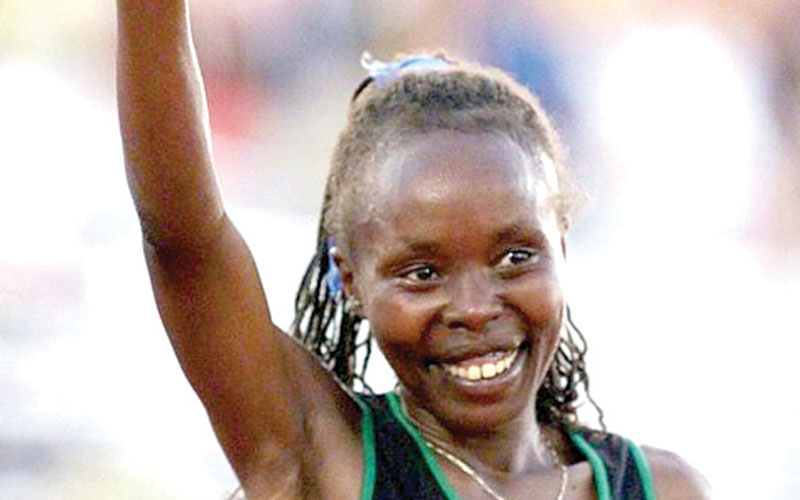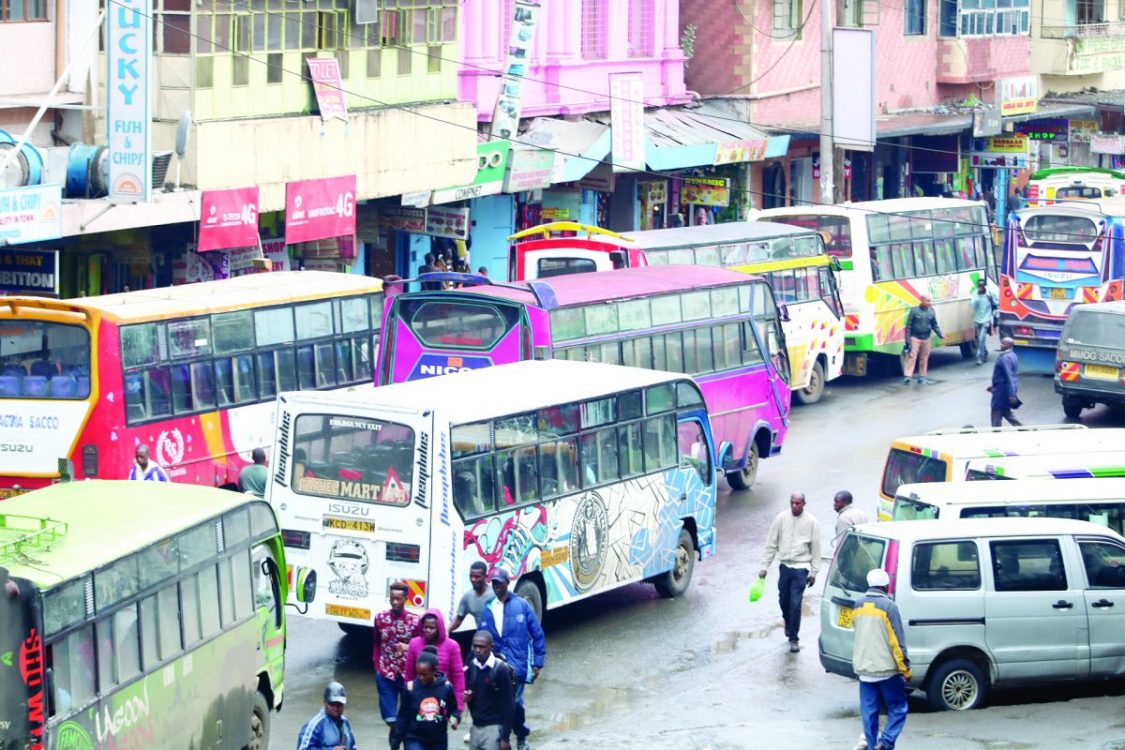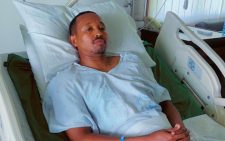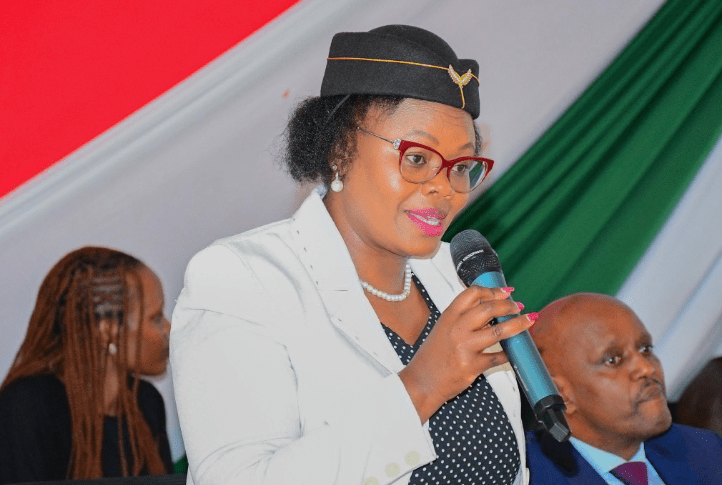Loroupe’s running career wasn’t a walk in the park

Many people see the crown, but they don’t know the pain behind it. Such is the story of world marathon champion Tegla Loroupe, who had to struggle to earn her space as her brother Festus Kiptoo reveals
“My sister is a role model and the light of not just our family, but the whole community. I feel nice when I get to the airport and receive her after she’s won prizes.
She has made the Loroupe name shine and we are proud of her,” begins 24-year-old Festus Kiptoo, Tegla Loroupe’s brother.
While to the world Loroupe is a world champion, to him she remains his elder sister, someone he looks up to and admires. Loroupe has not only inspired others but also her brother who one day desires to compete in athletics globally.
“I am currently a footballer, but there are other athletes in the family such as my elder brothers Titus Loroupe and Boaz Loroupe, who is currently is South America as a national coach for athletics. My dad feels blessed,” he narrates.
And whenever the siblings run their races, the family always cheers behind the scenes. However, this was not so when the 46-year-old began her career in athletics.
Her present success has managed to wash away the pain of her past challenges, rejection and fights to be recognised and permitted to do what she loved.
Loroupe grew up in West Pokot at a time when young girls were undergoing female circumcision, early marriages and weren’t considered worthy to be taken to school. So she stayed at home to take care of her siblings.
Her elder brother would then teach her numbers and letters after he came from school. Stirred by hunger for education, together with other girls in her village, they devised a plan.
“Girls would wake up and get out of the house without requesting for breakfast because if they asked for it, they would be questioned by their parents. They would then shower in the river on their way to school,” says Festus
Breaking barriers
Parents began complaining about this sudden disappearance of their daughters to school. Fearing being arrested by the chief because of stopping his child from going to school, her father allowed her to study.
At Kapsait Primary School, this is where her talent of running was nurtured. She balanced her studies and her new found passion and performed well in her Kenya Certificate of Primary Education (KCPE) exams.
“My brother failed and this demoralised my father to pay fees for him. He was encouraged to pay Tegla’s fees because of her outstanding performance, but she pleaded with my father to permit my brother to study. She made a pact with my father to quit athletics for my brother to study,” he says.
At school, a time came they were preparing for the cross-country championship and since everyone had to participate in sports, Loroupe had no choice. She was placed in a team with much older students and won the race,” Festus adds.
But more trouble was looming as her father learnt she had broken the pact and was now into sports. Loroupe explained it was in the school programme.
With athletics, she managed to find sponsors, got school uniforms and this further motivated Tegla’s father to allow his daughter to run.
After high school in 1985, she went to run at Kamarin, Elgeyo Marakwet where she met the dean of students, Rift Valley Institute of Technology.
“The KCSE results were not out yet she was offered a chance to study at the Nakuru-based college, a place that she wasn’t conversant with. However, she took the offer,” he narrates
She chose to pursue an accounting course. After college, in 1989, she got a job at the then Kenya Post and Telecommunication Corporation as an auditor. Here, she found a team and a coach who supported her passion.
“She would wake up early to exercise and then run to work. One day, she woke up at 4am to run 19 km from Kaptembo where she resided to Kabarak and her boss saw her while he was driving to work.
He thought that Tegla would arrive late, but was shocked to find out that she was the first to sign the work sheet. He even thought that there was someone who was signing for her,” he says.
When it came to competing internationally, it wasn’t a walk in the park. Athletics Kenya did not support her at first.
As her brother recalls, one time, upon reaching the airport, she was blocked from travelling with other athletes and discovered that malicious reports had apparently been sent abroad that she wasn’t fit for the race.
“By the time she arrived, she found out that the manager had already cancelled her races, but she wasn’t discouraged. She requested to compete in the available races,” he says.
It was winter and she didn’t have the required clothing. She was also left alone in a foreign country.
After this race, she returned to the country and in 1994, she participated in a race in Ngong where former president Daniel arap Moi was present and noticed her achievement.
The same year, she desired to participate in Good Will games and so she opted to train in Hungary, buying her own ticket.
On the day of the competition, she received shocking news from the organisers that she was not placed in the Kenyan team.
Turning point
“She didn’t participate in any race and this act made international media highlight how Kenya does not value her athletes.
When interviewed by journalists, she said she would train in Uganda because her passion was not to run for a European nation, but an African one,” narrates Festus.
This news of changing gear to Uganda reached the ears of the president and the minister for sports who invited Loroupe to State House. It is here that she poured out her frustrations.
This became a turning point in her life and her community as the president supported her passion to compete internationally.
The fact that she didn’t also demand for the officials to be fired gained her respect in the federation.
Free at last, Loroupe went on to break many records. In 1994, Loroupe ran her first major marathon in New York. She became the first African woman to win the New York marathon.
Between 1997 and 1999, she won three world titles a row over the half marathon distance. Among others, she won Rotterdam Marathon three times between 1997 and 1999.
She won Berlin Marathon in 1999 and finished second in 2001. She finished second at the 1999 Osaka International Ladies Marathon.
Her biggest successes include world records over 20, 25 and 30 kilometres as well as the past record over the marathon distance.
She used to hold the One Hour running World record of 18,340 m set in Borgholzhausen, Germany, but the record was broken by Dire Tune of Ethiopia 10 years later, in 2008 (new record 18,517 m).












